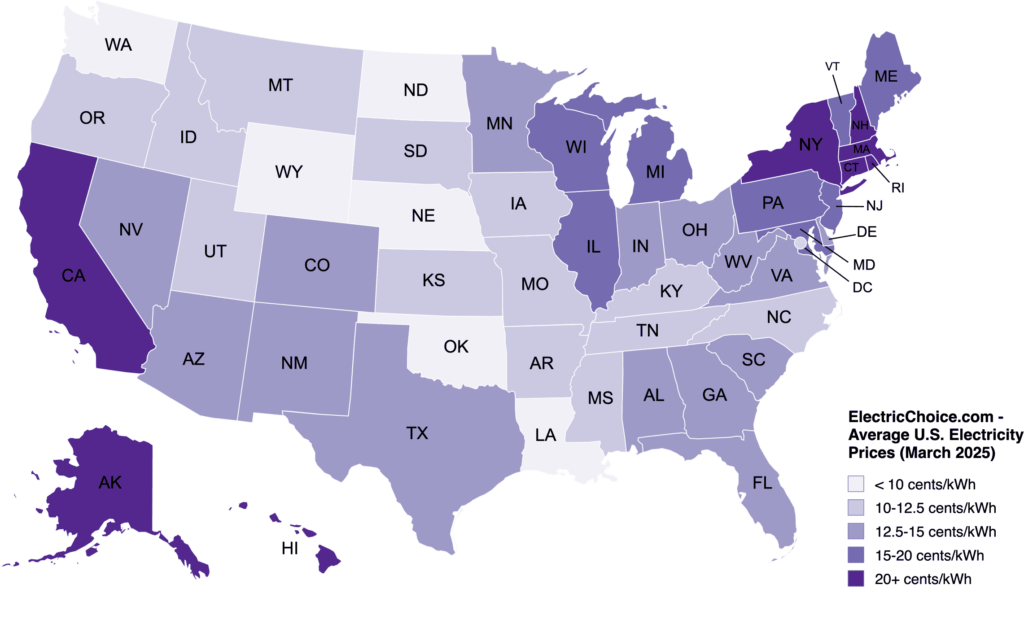Last updated:
The average electricity rate in the United States is 12.89¢ per kWh.
Map of Average kWh Rates by State
Here’s a map of average electricity rates by state — the darker the state is shaded, the more expensive the electricity:
 This map is updated monthly.
This map is updated monthly.
Table of Average Electricity (kWh) Prices
This table outlines the average residential and commercial electricity rates, as well as the total average rate, for each state.
| State ▲ | Residential | Commercial | Average |
|---|---|---|---|
| Alabama | 14.91 | 13.83 | 14.37¢ per kWh |
| Alaska | 22.38 | 18.43 | 20.41¢ per kWh |
| Arizona | 15.20 | 11.92 | 13.56¢ per kWh |
| Arkansas | 11.74 | 10.11 | 10.93¢ per kWh |
| California | 30.55 | 23.13 | 26.84¢ per kWh |
| Colorado | 15.16 | 11.12 | 13.14¢ per kWh |
| Connecticut | 28.16 | 23.40 | 25.78¢ per kWh |
| Delaware | 16.68 | 12.83 | 14.76¢ per kWh |
| District of Columbia | 18.83 | 17.53 | 18.18¢ per kWh |
| Florida | 14.20 | 11.20 | 12.70¢ per kWh |
| Georgia | 13.49 | 11.31 | 12.40¢ per kWh |
| Hawaii | 42.34 | 38.29 | 40.32¢ per kWh |
| Idaho | 10.97 | 8.34 | 9.66¢ per kWh |
| Illinois | 15.99 | 11.64 | 13.82¢ per kWh |
| Indiana | 14.42 | 12.45 | 13.44¢ per kWh |
| Iowa | 12.43 | 10.19 | 11.31¢ per kWh |
| Kansas | 13.85 | 10.74 | 12.30¢ per kWh |
| Kentucky | 13.28 | 11.91 | 12.60¢ per kWh |
| Louisiana | 11.70 | 10.73 | 11.22¢ per kWh |
| Maine | 26.29 | 19.57 | 22.93¢ per kWh |
| Maryland | 18.15 | 13.55 | 15.85¢ per kWh |
| Massachusetts | 31.22 | 22.46 | 26.84¢ per kWh |
| Michigan | 18.41 | 13.73 | 16.07¢ per kWh |
| Minnesota | 14.05 | 10.98 | 12.52¢ per kWh |
| Mississippi | 13.44 | 12.34 | 12.89¢ per kWh |
| Missouri | 11.57 | 9.45 | 10.51¢ per kWh |
| Montana | 11.87 | 10.95 | 11.41¢ per kWh |
| Nebraska | 10.78 | 8.20 | 9.49¢ per kWh |
| Nevada | 14.88 | 9.85 | 12.37¢ per kWh |
| New Hampshire | 23.62 | 19.91 | 21.77¢ per kWh |
| New Jersey | 19.49 | 14.76 | 17.13¢ per kWh |
| New Mexico | 14.26 | 10.49 | 12.38¢ per kWh |
| New York | 24.37 | 18.77 | 21.57¢ per kWh |
| North Carolina | 13.49 | 10.92 | 12.21¢ per kWh |
| North Dakota | 10.21 | 7.18 | 8.70¢ per kWh |
| Ohio | 15.98 | 10.68 | 13.33¢ per kWh |
| Oklahoma | 11.52 | 8.48 | 10.00¢ per kWh |
| Oregon | 14.12 | 10.58 | 12.35¢ per kWh |
| Pennsylvania | 17.60 | 11.12 | 14.36¢ per kWh |
| Rhode Island | 25.31 | 24.08 | 24.70¢ per kWh |
| South Carolina | 13.87 | 10.62 | 12.25¢ per kWh |
| South Dakota | 12.42 | 10.61 | 11.52¢ per kWh |
| Tennessee | 13.04 | 12.73 | 12.89¢ per kWh |
| Texas | 15.32 | 8.85 | 12.09¢ per kWh |
| Utah | 11.02 | 7.77 | 9.40¢ per kWh |
| Vermont | 22.29 | 19.58 | 20.94¢ per kWh |
| Virginia | 14.46 | 9.05 | 11.76¢ per kWh |
| Washington | 11.83 | 10.59 | 11.21¢ per kWh |
| West Virginia | 14.51 | 11.77 | 13.14¢ per kWh |
| Wisconsin | 16.31 | 11.76 | 14.04¢ per kWh |
| Wyoming | 11.78 | 9.07 | 10.43¢ per kWh |
| U.S. Average | 16.26 | 12.76 | 12.89¢ per kWh |
Source: Internal/proprietary data collected and cataloged from utilities and energy providers, and EIA
Here are some quick takeaways from the data in our table:
- Cheapest Electricity Rates: North Dakota has the best electricity rates on average with 10.21¢/kWh for homes and 7.18¢/kWh for businesses.
- Most Expensive Rates: Hawaii has the highest rates for electricity with 42.34¢/kWh for residential and 38.29¢/kWh for commercial customers.
- Trends & Ranges: Residential electricity rates vary from 10.21¢ (North Dakota) to 42.34¢ (Hawaii). Commercial electricity ranges from 7.18¢ (North Dakota) to 38.29¢ (Hawaii).
